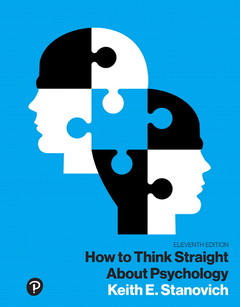Description
How to Think Straight About Psychology, Books a la Carte (11th Ed.)
Author: Stanovich Keith
Language: English
Approximative price 63.80 €
In Print (Delivery period: 12 days).
Add to cart176 p. · 21.6x26.9 cm · Paperback
Description
/li>Contents
/li>Biography
/li>Comment
/li>
NOTE: This edition features the same content as the traditional text in a convenient, three-hole-punched, loose-leaf version. Books a la Carte also offer a great value; this format costs significantly less than a new textbook. Before purchasing, check with your instructor or review your course syllabus to ensure that you select the correct ISBN.
For courses in introductory psychology, critical thinking, and research and experimental methods.
Market-leading consumer?s guide to assessing psychological claims
Widely used and highly acclaimed, How to Think Straight About Psychology introduces students to the critical thinking skills they need to independently evaluate psychological information. Students will learn to analyze psychological claims found in the media, distinguish between pseudoscience and true psychological research, and apply psychological knowledge to the world around them. The 11th edition covers an extensive range of new topics and examples illustrating psychological principles, pseudoscience, and issues obscuring the real and growing knowledge base in the field of psychology.
1. Psychology Is Alive and Well (and Doing Fine Among the Sciences)
2. Falsifiability: How to Foil Little Green Men in the Head
3. Operationism and Essentialism: “But, Doctor, What Does It Really Mean?”
4. Testimonials and Case Study Evidence: Placebo Effects and the Amazing Randi
5. Correlation and Causation: Birth Control by the Toaster Method
6. Getting Things Under Control: The Case of Clever Hans
7. “But It’s Not Real Life!”: The “Artificiality” Criticism and Psychology
8. Avoiding the Einstein Syndrome: The Importance of Converging Evidence
9. The Misguided Search for the “Magic Bullet”: The Issue of Multiple Causation
10. The Achilles’ Heel of Human Cognition: Probabilistic Reasoning
11. The Role of Chance in Psychology
12. The Rodney Dangerfield of the Sciences
Keith E. Stanovich is currently Emeritus Professor of Applied Psychology and Human Development at the University of Toronto. He is the author of over 175 scientific articles and eight books. Stanovich is the 2012 recipient of the E. L. Thorndike Career Achievement Award from the American Psychological Association and the recipient of the 2010 Grawemeyer Award in Education. In 2000 he received the Distinguished Scientific Contribution Award from the Society for the Scientific Study of Reading. Stanovich is a Fellow of the American Psychological Association (Divisions 3, 7, 8, and 15) and the Association for Psychological Science.
Practical skills and resources for assessing psychological claims
- Students learn critical analytical skills for evaluating psychological claims found in the media and self-help literature – skills that are often unaddressed in the average introductory psychology course.
- The text presents vital conceptsaiding in critical evaluation of psychological information, such as falsifiability, operationism, experimental control, converging evidence, correlational vs. experimental studies, and statistics.
- How To feature offers practical tips for distinguishing between pseudoscience and true psychological research, transforming readers into discriminating consumers of psychological information.
- Expanded - The new edition includes 290 new citations providing the most up-to-date references relevant to concepts and experimental effects discussed throughout the text.
Examples modeling critical thinking skills
- The text illustrates psychological principles using current issues, such as evidence of the connectivity principle in the issue of driving accidents caused by cell phone use and the misleading use of probability to assess flood risk.
- Updated - Dated examples have been replaced with new contemporary examples, including the evils of vanity publishing and why alternative medicine wastes millions of dollars in health care spending.
- New - The new edition provides newexamples of pseudoscience encountered in the media, such as the media’s suggestion that science is non-cumulative in their reporting of research on autism, reading disability, and ADHD.
- New - Additional studies are cited, including Walter Mischel’s famous marshmallow studies and meta-analytic studies on marriage longevity, brain training, predictors of job performance, a




